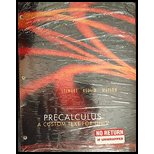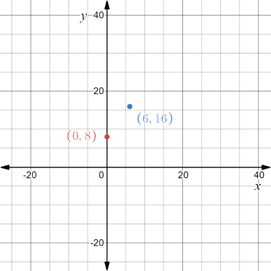
Concept explainers
To graph: The points
Explanation of Solution
Given information:
The points,
Graph:
The plot the points
Construct a Cartesian plane with vertical axis as y-axis and horizontal axis as x-axis.
Marks the numbers on both the axes.
Plot the points

Interpretation:
The Cartesian plane is divided into four quadrant. Numbers on right of zero are positive, on left of zero are negative. Numbers above zero on vertical line are positive and numbers below 0 are negative. Each pair of point in the coordinate plane is represented as an ordered pair
To calculate: The distance between the pair of points
Answer to Problem 13E
The distance between the pair of points
Explanation of Solution
Given information:
The points
Formula used:
Distance
Calculation:
Consider the points
Recall that the distance
Evaluate the distance between
Thus, the distance between the pair of points is
To calculate: The midpoint of the segment that joins the pair of points
Answer to Problem 13E
The midpoint of the segment that joins the pair of points
Explanation of Solution
Given information:
The points are
Formula used:
Midpoint of the segment that joins two points
Calculation:
Consider the points
Recall that the midpoint of the segment that joins two points
Evaluate the midpoint of the segment that joins
Thus, the midpoint of the segment that joins the pair of points is
Chapter 1 Solutions
Precalculus - A Custom Text for UNLV
- H.W Ex find the solution by using Bernoulli method of D.E? dy/dx4y = xy³/2arrow_forwardby series find the Solution U (x) = x²- X³+ x²+'S (1+x+) u(t) st 0 (2) u(x) = x's (6x-2+) u(t) St U (x) = x + 2 {xt 41t) dt u(x)=x+2arrow_forwardConsider the Boundary-Initial Value problem J²u и ди 4 0 0 მე2 It u(0,t) = 0, 0, u(6,t) = 0, t>0 u(x, 0) = x(6x), 0 < x <6 This models a heated wire, with zero endpoints temperatures. The solution u(x,t) of the initial-boundary value problem is given by the series u(x,t)-b, sin П3 n=1 (b, sin ((2n − 1) — x) e-cnt where bn ☐ and Сп ☐arrow_forward
- • -7 10 1.0 (2 - x) for 0 < x < 2, Let f(x) = for 2< x < 6. Compute the Fourier cosine coefficients for f(x). Ao An Give values for the Fourier cosine series C(x) = = Ao • C(6) = = C(-1) = = C(11) = + n=1 IM 8 An cos пп (π x ). 6arrow_forwardThe Fourier series of the function is given by where со Сп and bn || f(x) = {- 9x if π < x < 0 -4x if 0 < x < π f(x) ~ CO n=0 (Cn cos ((2n+1) x) - Σ bn sin (nx) n=1arrow_forwardConsider the Boundary-Initial Value problem a²u J²u 9 მე2 Ət²' , 0 0 u(0,t) = 0, u(5,t) = 0, ди u(x, 0) = x(5 − x), at t>0 (x, 0) = 0, 0 < x < 5 This models the displacement u(x,t) of a freely vibrating string, with fixed ends, initial profile x (5 - x), and zero initial velocity. The solution u(x, t), is given by the series ∞ 4 u(x, t) = n=1 bɲ sin (· П (n = 7 x ) cos(cnt) where ཆུ་ང་ and Сп =arrow_forward
- The Fourier sine series of the function is given by 3x f(x) = = if 0x5/3 5 if 5/3 x < 5 where bn b₁ = ☐ ∞ ƒ(2) ~ Σb, sin (n = 2) n=1 (품)arrow_forwardFind the values of a and b for which each function will be differentiable for all values of x on its domain. Note: Please write the answer in the form of ordered pairs (a, b). a² f(x) = x -2b, x ≤-1 b²x,x > −1 2ax²+62arrow_forwardk. 1. |_ 1/2 S 0 cos(x-2) x3 √1+ e¯x ex dx dxarrow_forward
- Attempt 6: 1 out of 2 parts have been answered correctly. Calculate the Taylor polynomials T2(x) and T3(x) centered at x = 7 for f(x) = ln(x + 1). T₂(x) T-(2) - in (8) - (½) (x-7) - (128)(x-7)2 8 Tз(x) = 2(x)+ In(8) + ½ ½ (x-7) - 128 (x-7)² + 1536 (x-7)3 8 Try again Next item Answers Attempt 6 of 6 Ei T The Weather Channel DELL UP % 8 9 205 54 # m E R D F G Harrow_forwardQuestion 3 1 pts By changing to spherical coordinates, calculate A = SSS, e(x²+y²+z²)³/2/2 dV, = 2x and y = where D is the region in the first octant between the planes y = above the cone z = /3(x² + y²), and between the spheres x² + y² + z² and x² + y² + z² = 4. Then sin(4A) is 3x, = 1 0.442 -0.438 -0.913 0.143 -0.502 -0.574 0.596 -0.444arrow_forward2.10 Related rares show me all the correc steps and calculation please DO NOT GIVE ME THE WROTE ANSWER A stone is dropped into a pond, forming a circular wave whose radius is increasing at a rate of 3 inches per second. When the radius is 9 inches, at what rate is the area of the wave growing?arrow_forward
 Calculus: Early TranscendentalsCalculusISBN:9781285741550Author:James StewartPublisher:Cengage Learning
Calculus: Early TranscendentalsCalculusISBN:9781285741550Author:James StewartPublisher:Cengage Learning Thomas' Calculus (14th Edition)CalculusISBN:9780134438986Author:Joel R. Hass, Christopher E. Heil, Maurice D. WeirPublisher:PEARSON
Thomas' Calculus (14th Edition)CalculusISBN:9780134438986Author:Joel R. Hass, Christopher E. Heil, Maurice D. WeirPublisher:PEARSON Calculus: Early Transcendentals (3rd Edition)CalculusISBN:9780134763644Author:William L. Briggs, Lyle Cochran, Bernard Gillett, Eric SchulzPublisher:PEARSON
Calculus: Early Transcendentals (3rd Edition)CalculusISBN:9780134763644Author:William L. Briggs, Lyle Cochran, Bernard Gillett, Eric SchulzPublisher:PEARSON Calculus: Early TranscendentalsCalculusISBN:9781319050740Author:Jon Rogawski, Colin Adams, Robert FranzosaPublisher:W. H. Freeman
Calculus: Early TranscendentalsCalculusISBN:9781319050740Author:Jon Rogawski, Colin Adams, Robert FranzosaPublisher:W. H. Freeman
 Calculus: Early Transcendental FunctionsCalculusISBN:9781337552516Author:Ron Larson, Bruce H. EdwardsPublisher:Cengage Learning
Calculus: Early Transcendental FunctionsCalculusISBN:9781337552516Author:Ron Larson, Bruce H. EdwardsPublisher:Cengage Learning





